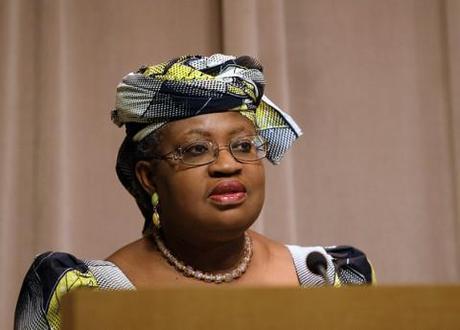
Ngozi Okonjo-Iweala. Photo credit: World Bank Photo Collection
The race to be the next president of the World Bank is revving up. Three candidates – Nigeria’s Finance Minister Ngozi Okonjo-Iweala, Jose Antonio Ocampo, a former finance minister of Colombia, and Dr Jim Yong Kim, a public health expert and president of Dartmouth College in the US – have emerged from the pack of contenders to succeed outgoing president Robert Zoellick, who is due to check out by 20 April 2012. The ongoing race is being closely watched because it represents the first proper merit-based contest for the top job since the Bank was created after World War II. In the past, as per an unwritten convention, the US — the largest single majority shareholder of the bank — got to select the president of the Bank which is, at its core, a development institution.
US President Barack Obama has backed Korean-American medical doctor and anthropologist Dr Kim, noted the BBC. But the rest of the world aren’t all convinced of Kim’s credentials for the post. The fact Kim is not a trained economist – unlike the other two candidates – has concerned some. In an open letter, 35 former economists and managers said the Bank should choose the next chief on merit. Another group of economists this week signed a petition backing Ocampo.
Brics countries flexing muscles. “The three-way fight is attracting increasingly passionate comment from candidates’ supporters,” reported the BBC, which noted “it has also shone a light on the way the World Bank chooses its head.” The US, Europe and Japan have 54% of the votes and under an informal arrangement the US chooses the World Bank president on the understanding that Europe appoints a European as head of the International Monetary Fund (IMF), the Bank’s sister institution. However, the BBC reported that emerging economies “have become increasingly unhappy with this system” and are pushing for change: “The leaders of Russia, Brazil, China, India and South Africa recently called for a review of that weighted voting system. The nations, sometimes referred to as the Brics countries, are working to chose a joint candidate, according to the Brazilian finance minister Guido Mantega.”
US must embrace increased World Bank transparency. Writing at The New York Times, Thomas J. Bollyky, senior fellow for global health, economics and development at the Council on Foreign Relations, argued that “the controversy around Dr. Kim’s nomination is understandable … For decades, America has effectively had unilateral control over who gets to lead the World Bank. Mr. Obama’s unconventional pick of Dr. Kim, a physician and anthropologist, has opened the door to developing countries to put forward their own candidates whose economic and banking qualifications more closely resemble those of past leaders of the bank.” Bollyky backed Kim as the “right” and “inspired” choice yet insisted that the Bank “will suffer unless the United States takes the high ground and uses this controversy to reform how the institution is governed. Only by embracing a competitive election process can the United States ensure that Dr. Kim will have the mandate to revitalize an institution long resistant to change.”
“President Obama has made an inspired nomination of an unconventional candidate to lead the World Bank back into relevance. The United States must now vindicate that choice by embracing a competitive election process that would give Dr. Kim the mandate he needs to advance the interests of the world’s poor, as well as America’s interests,” insisted Thomas J. Bollyky at The New York Times.
Welcome competition. Writing at The Baltimore Sun, M.G. Quibria, a professor of development economics at Morgan State University, concurred that “change” is what the World Bank “needs” and welcoming the merit-based race: “Overall, this increased competition has augured well for the bank, as it has attracted a field of strong candidates.” Quibria pointed out “flaws” in each candidate but concluded that “the flaws of these candidates aside, what represents an unambiguous advance over the past is the current selection process, which is more open and transparent — an important reform for so critical a global institution.”
Ngozi Okonjo-Iweala stakes her claim. Writing in The Financial Times, Okonjo-Iweala set out her “vision” for the World Bank. She argued that, “emerging countries, once dependent on the World Bank, have become world powers. Growth across Asia, Africa and Latin America is transforming the global economy. The World Bank must adapt to such tectonic shifts … ” Claiming to “represent the aspirations of many people from the developing world,” Okonjo-Iweala said that the Bank must respond quickly and effectively to three key challenges facing its client countries in “ways that respect their priorities, their culture and their own processes.” “These three major challenges – creating jobs, investing in the human capital of the poor and building institutions – have to be pursued with vigour,” insisted Okonjo-Iweala, who concluded, “the work of the World Bank affects the welfare of millions of citizens and the prospects for a more peaceful world. I would be most honoured to lead this important institution with a sense of humility, urgency and hope at this time of change and challenge.”

